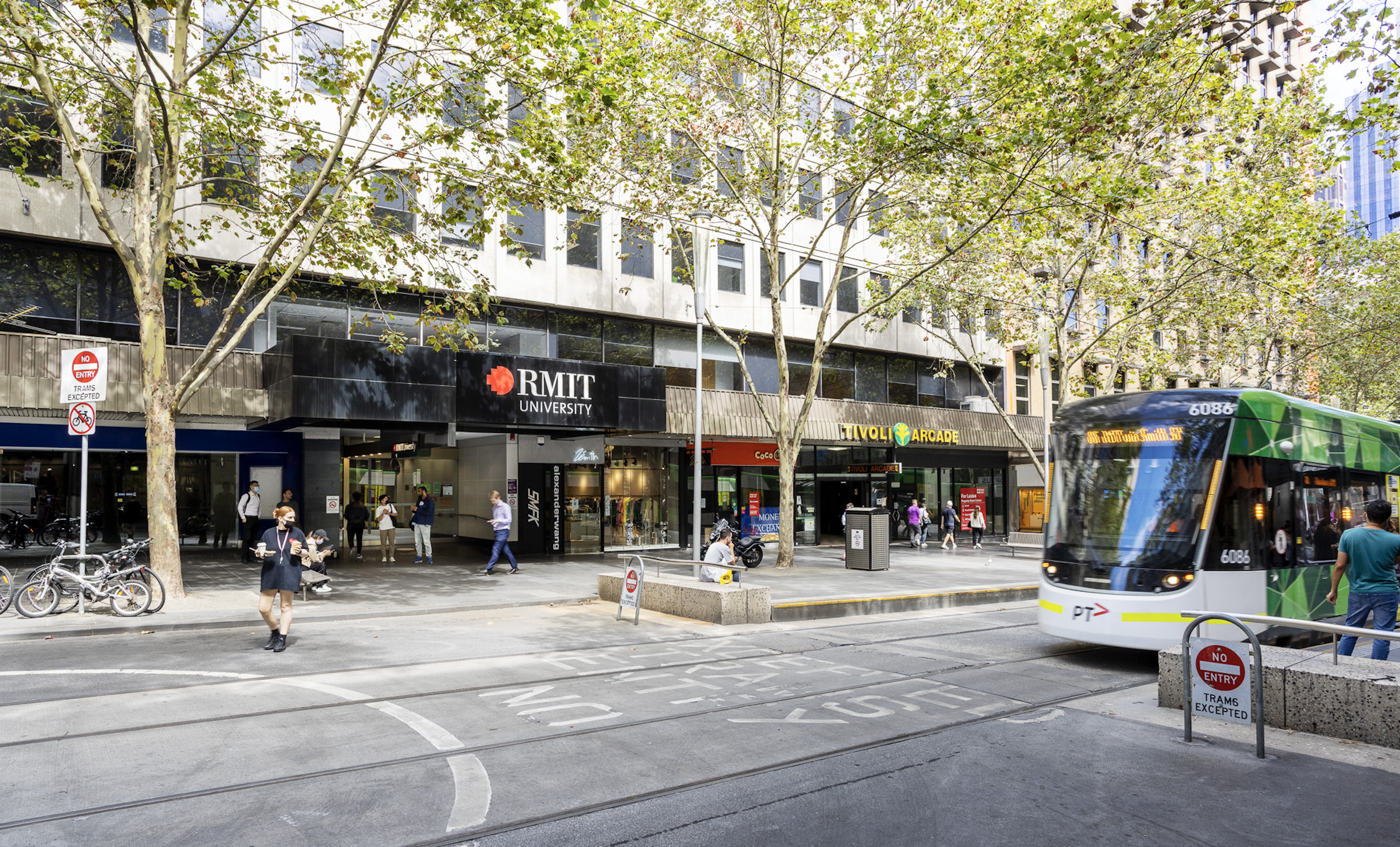IELTS with RMIT English Worldwide
Overview
.jpg)
RMIT Training is a Melbourne-based company owned by RMIT University. Our English Testing Centre, RMIT English Worldwide (REW), offers IELTS testing.
Taking an IELTS at RMIT Training can help you with your career, your Australian visa application or entry into an Australian university.
ELTS is recognised and accepted by over 12,000 organisations worldwide, including universities, employers, professional bodies, immigration authorities and other government agencies.
What is IELTS?
The International English Language Testing System (IELTS) is the world’s most popular English language test for tertiary education, work and migration purposes. IELTS is formed by a global partnership of language experts including IDP, IELTS Australia, the British Council and Cambridge English Language Assessment.
Millions of IELTS tests are taken in over 140 countries each year.
Why take the IELTS test?
IELTS is the only internationally recognised English language test where the Speaking section of the test is held with an examiner in a private room, free from interruption. Our examiners are fully qualified, follow rigorous global IELTS standards and are regularly monitored and re-certified.
IELTS content is developed by an international team of experts and extensively researched to ensure the test is fair and unbiased for all, regardless of nationality, gender, lifestyle or location.

Why choose RMIT Training?
RMIT Training is one of Melbourne’s most established IELTS test centres. We are centrally located in Melbourne CBD, close to a range of public transport.
Our testing centre offers both paper-based and computer-delivered IELTS, so you can choose the test format that is right for you. Test days are scheduled regularly, and all four sections of the test are held on the same day.
Centrally located
in Melbourne's CBD
Easily accessible
via public transport
Paper-based and Computer-delivered
tests available
Paper-based and Computer-delivered IELTS
RMIT Training offers the convenience of both paper-based and computer-delivered IELTS tests.
Some test-takers feel more comfortable with the traditional paper-based test format. It is worth keeping in mind that the computer-based test is designed for people with a ‘typical’ typing speed. If you have basic computer literacy, you can sit a computer-based test.
.jpg)
A computer-based test is a good option if you have an urgent visa or university application. You can book your test today and receive your results the next week. Please note that you must book your test at least 72 hours before the test date.
In both test formats, the Speaking test remains a face-to-face interview with one of our certified IELTS examiners. Each test (Writing, Reading, Listening and Speaking) take place on the same day at the same venue for both paper-based and computer-delivered IELTS tests.
Computer-delivered IELTS |
Paper-based IELTS |
|
|

IELTS One Skill Retake
RMIT English Worldwide is pleased to offer IELTS One Skill Retake.
With IELTS One Skill Retake, you have the option to retake any one of the four skills (Listening, Reading, Writing, or Speaking) if you need to improve on one area. The format and timing of the One Skill Retake test is the same as a normal IELTS test, but you can save time by not needing to complete the other three skills.
IELTS One Skill Retake is currently only available for IELTS on Computer tests.
Prepare for IELTS

We want you to succeed at RMIT Training, so when you choose to take your IELTS test with us you gain access to a free online IELTS Preparation Course valued at $80. To register, click the banner in your booking confirmation email and start practicing.
Choose from the following options for your free online IELTS Preparation Course:
30-day access to focus on ONE IELTS skill (Writing, Reading, Listening or Speaking)
4-day unlimited access to study ALL FOUR IELTS skills
Both courses include:
8 mock tests with feedback
100+ practice questions and quizzes
60+ expert tutorial videos
and much more!
Find out more about these courses designed to give you the confidence and skills you need on your test day.
What are the IELTS test fees?
The test fee for both Academic and General Training IELTS in Australia is $445. This includes the registration and payment processing fees.
Please note: The IELTS test fee will increase to $445 from March 1 2024.
Refunds and transfers
To change your test date or request a refund of the test fee you need to submit a Request for Refund or Test Date Transfer Form. The form must be submitted a minimum of 5 days prior to your test date.
Cancellations
Cancellations made more than 5 days before the test will incur a $15 administration fee.
Cancellations made within 5 days of the test date will incur an administrative fee of up to 25% of the full test cost.
Transfers
Changes to test date made within 5 days of the test date may incur an administrative fee of 25% of the full test fee.
A test booking may only be transferred once. Any test bookings transferred more than once may be treated as a cancellation and will incur applicable fees.
Please ensure you read the terms outlined in Cancellations, Transfer and Refunds for IELTS Test Takers at RMIT Training.
RMIT Training IELTS test centre dates

You can view all our upcoming IELTS test dates on our IELTS booking page.
Contact us to find out how many seats are available on your preferred date.
IELTS test location

Our Test Centre is located at RMIT Training Melbourne:
Level 10
RMIT University Building 108
235–251 Bourke Street Melbourne VIC 3000
We are conveniently located across from the route 86 and 96 trams, right near the Bourke Street Mall and close to Swanston Street.
IELTS test components — Writing, Reading, Listening & Speaking
Timing
Approximately 30 minutes (plus 10 minutes’ transfer time).
Questions
There are 40 questions. A variety of question types are used, chosen from the following: multiple choice, matching, plan/ map/diagram labelling, form completion, note completion, table completion, flow-chart completion, summary completion, sentence completion, short-answer questions.
Test Parts
There are 4 sections:
Section 1 is a conversation between two people set in an everyday social context (e.g. a conversation in an accommodation agency).
Section 2 is a monologue set in an everyday social context (e.g. a speech about local facilities or a talk about the arrangements for meals during a conference).
Section 3 is a conversation between up to four people set in an educational or training context (e.g. a university tutor and a student discussing an assignment, or a group of students planning a research project).
Section 4 is a monologue on an academic subject (e.g. a university lecture).
Each section is heard once only. A variety of voices and native-speaker accents are used.
Skills assessed
A wide range of listening skills are assessed, including:
- understanding of main ideas
- understanding of specific factual information
- recognising opinions, attitudes and purpose of a speaker
- following the development of an argument.
Marking
Each correct answer receives 1 mark. Scores out of 40 are converted to the IELTS 9-band scale.
Scores are reported in whole and half bands.
Timing
60 minutes (no extra transfer time).
Questions
There are 40 questions. A variety of question types are used, chosen from the following: multiple choice, identifying information (True/False/Not Given), identifying a writer’s views/claims (Yes/No/Not Given), matching information, matching headings, matching features, matching sentence endings, sentence completion, summary completion, note completion, table completion, flow-chart completion, diagram label completion, short-answer questions.
Test Parts
There are 3 sections. The total text length is 2,150-2,750 words.
Academic Reading
Each section contains one long text. Texts are authentic and are taken from books, journals, magazines and newspapers. They have been written for a non-specialist audience and are on academic topics of general interest. Texts are appropriate to, and accessible to, test takers entering undergraduate or postgraduate courses or seeking professional registration. Texts range from the descriptive and factual to the discursive and analytical. Texts may contain non-verbal materials such as diagrams, graphs or illustrations. If texts contain technical terms, then a simple glossary is provided.
General Training Reading
Section 1 contains two or three short factual texts, one of which may be composite (consisting of 6-8 short texts related by topic,e.g. hotel advertisements). Topics are relevant to everyday life in an English-speaking country.
Section 2 contains two short factual texts focusing on workrelated issues (e.g. applying for jobs, company policies, pay and conditions, workplace facilities, staff development and training).
Section 3 contains one longer, more complex text on a topic of general interest.
Texts are authentic and are taken from notices, advertisements, company handbooks, official documents, books, magazines and newspapers.
Skills assessed
A wide range of reading skills are assessed, including:
- reading for gist
- reading for main ideas
- reading for detail
- understanding inferences and implied meaning
- recognising writer’s opinions, attitudes and purpose
- following the development of an argument.
Marking
Each correct answer receives 1 mark. Scores out of 40 are converted to the IELTS 9-band scale.
Scores are reported in whole and half bands.
Timing
60 minutes
Tasks
There are 2 tasks. You are required to write at least 150 words for Task 1 and at least 250 words for Task 2.
Test Parts
There are 2 parts.
Academic Writing
In Task 1, you are presented with a graph, table, chart or diagram and are asked to describe, summarise or explain the information in your own words. You may be asked to describe and explain data, describe the stages of a process, how something works or describe an object or event. In Task 2, you are asked to write an essay in response to a point of view, argument or problem. The issues raised are of general interest to, suitable for and easily understood by test takers entering undergraduate or postgraduate studies or seeking professional registration. Responses to Task 1 and Task 2 should be written in an academic, semi-formal/neutral style.
General Training Writing
In Task 1, you are presented with a situation and are asked to write a letter requesting information or explaining the situation. The letter may be personal or semi-formal/neutral in style. In Task 2, you are asked to write an essay in response to a point of view, argument or problem. The essay can be slightly more personal in style than the Academic Writing Task 2 essay. Topics are of general interest.
Skills assessed
In both tasks, you are assessed on your ability to write a response which is appropriate in terms of:
- content
- the organisation of ideas
- the accuracy and range of vocabulary and grammar.
Academic Writing
In Task 1, depending on the task type, you are assessed on your ability to organise, present and possibly compare data; to describe the stages of a process or procedure; to describe an object or event or sequence of events; to explain how something works. In Task 2, depending on the task type, you are assessed on your ability to present a solution to a problem; to present and justify an opinion; to compare and contrast evidence, opinions and implications; to evaluate and challenge ideas, evidence or an argument.
General Training Writing
In Task 1, depending on the task type, you are assessed on your ability to engage in personal correspondence in order to: elicit and provide general factual information; express needs, wants, likes and dislikes; express opinions (views, complaints etc.). In Task 2, you are assessed on your ability to provide general factual information; to outline a problem and present a solution; to present and possibly justify an opinion; to evaluate and challenge ideas, evidence or an argument.
Marking
You are assessed on your performance on each task by certificated IELTS examiners according to the IELTS Writing test assessment criteria (Task Achievement/Response, Coherence and Cohesion, Lexical Resource, Grammatical Range and Accuracy). The public version of the assessment criteria can be found at ielts.org/criteria.
Task 2 contributes twice as much as Task 1 to the Writing score.
Scores are reported in whole and half bands.
Timing
11-14 minutes
Test Parts
There are 3 parts.
Part 1 Introduction and interview (4-5 minutes)
The examiner introduces him/herself and asks you to introduce yourself and confirm your identity. The examiner asks you general questions on familiar topics, e.g. home, family, work, studies and interests.
Part 2 Individual long turn (3-4 minutes)
The examiner gives you a task card which asks you to talk about a particular topic and which includes points you can cover in your talk. You are given 1 minute to prepare your talk, and are given a pencil and paper to make notes. You talk for 1-2 minutes on the topic. The examiner may then ask you one or two questions on the same topic.
Part 3 Two-way discussion (4-5 minutes)
The examiner asks further questions which are connected to the topic of Part 2. These questions give you an opportunity to discuss more abstract issues and ideas.
Skills assessed
A wide range of speaking skills are assessed, including:
- the ability to communicate opinions and information on everyday topics and common experiences and situations by answering a range of questions
- the ability to speak at length on a given topic using appropriate language and organising ideas coherently
- the ability to express and justify opinions and to analyse, discuss and speculate about issues.
Marking
You are assessed on your performance throughout the test by certificated IELTS examiners according to the IELTS Speaking test assessment criteria (Fluency and Coherence, Lexical Resource, Grammatical Range and Accuracy, Pronunciation). The public version of the assessment criteria can be found at ielts.org/criteria.
Scores are reported in whole and half bands.
On the day of the test
When you arrive for your test, you must report to the security team at reception for instructions on where to go for your test. Let them know if you are taking the paper-based or computer-delivered test, as your testing location will be different.
Remember to bring your passport (unless you have been pre-approved to use other form of ID) or you will not be able to sit the test.
You can bring a transparent water bottle into the testing room.
You must have your photograph taken and have a fingerprint scanned for security and identification purposes on the day of the test.
IELTS test results
The test results for IELTS are available:
- For IELTS on Computer = 2-5 days after the test day
- For IELTS on Paper = 13 days after the test day
Your IELTS test results come in a report known as the Test Report Form (TRF).
IELTS on Computer
You will receive an email when your eTRF is available to view and download. You can then access your eTRF on your IELTS account.
IELTS on Paper
Your TRF will be mailed directly to the address you provided when booking your test.
You can preview your results online by entering the following information:
- Given and family name
- Passport or ID number
- Date of birth
Results are released gradually throughout the day from 12am onwards. If you are unable to view your results, please wait for an hour and try again. All results should be available by the end of the day
You will receive five scores for your IELTS test: one for each section of the test and an overall score. You will also receive a brief description of your level.
Your results will place you on the IELTS nine-band scale:
9 Expert user
8 Very good user
7 Good user
6 Competent user
5 Modest user
4 Limited user
3 Extremely limited user
2 Intermittent user
1 Non user
0 Did not attempt the test
Check the entry requirements with the institution or organisation you are interested in applying to. The required IELTS score can vary between institutions and organisations.
Your Test Report Form (TRF) is valid for 2 years. We can send up to five additional copies on your behalf to other institutions or organisations. If you need your TRF re-issued, please complete the IELTS Test Report Form Request. Test Report Forms for tests taken more than 2 years ago cannot be re-issued.
You may request IELTS Australia to carry out an Enquiry on Results. The application must be submitted within 6 weeks of your test date. You can choose to have one or more modules of your test re-marked. However, the fee remains the same. The process can take up to 21 days to be finalised.
If your score is increased, the fee will be refunded and a new Test Report Form will be issued.
The fee for an EOR is $215.
IELTS on Paper
Complete the IELTS Enquiry on Results Form and submit it to englishworldwide@rmit.edu.au, then pay the application fee.
IELTS on Computer
- Login to your IELTS account,
- View your past results
- Select ‘Remark’
